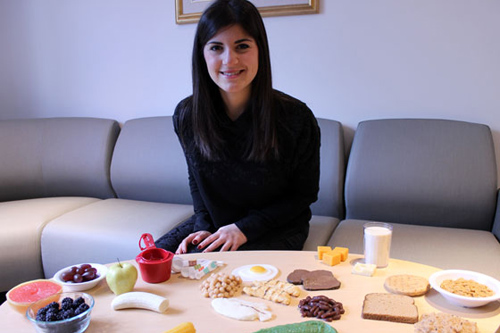
Cancer survivor Megan Morrison uses fake food to help patients understand the importance of portion control. For many patients, visualizing the portion amount helps them make the right decision when they are on their own. (Photo: UHN)
Megan Morrison was 16 when she was diagnosed with Hodgkin's Lymphoma.
A high school student at the time, Morrison and her family were shocked that she had cancer at such a young age.
Despite the diagnosis, Morrison was determined to stay in school and keep up with her daily life.
She balanced classes with chemotherapy treatment at Princess Margaret Cancer Centre for six months, followed by radiation treatment for a couple of weeks.
During treatment, Morrison's relationship with food changed.
"I wasn't hungry at all but I had to consume enough protein and calories to keep me strong," she said. "I also gained 25 pounds from my medication and I remember thinking, 'I have to lose my hair and gain weight?' At 16 years old it was difficult to get through."
Morrison recovered with support from her family and people at The Princess Margaret.
Today, she has been cancer-free for almost 10 years.
Reconnecting with The Princess Margaret
Morrison attended Western University and set her sights on becoming a dietitian.
She completed her internship at UHN and knew she wanted to work there because of her relationship with The Princess Margaret. She also wanted the opportunity to work with a variety of patients.
Today, as a registered dietitian, Morrison works at UHN's The Dalglish Family Hearts and Minds Clinic and Malignant Hematology at The Princess Margaret.
For her, it's a dream come true.
"I don't share the fact that I had cancer with patients because my job is to focus entirely on the patient experience," said Morrison. "But I do understand what it means to struggle with health, weight management and chronic illness. This allows me to feel connected to the people I work with."
Nutrition Month
Since
March is Nutrition Month, it's a time to raise awareness about the importance of proper nutrition and the variety of clinical services available to patients.
Morrison works with patients to help define goals for better nutrition, determining their willingness for change and whether it's the right time for it.
"Nutrition plays such an important role in recovery," Morrison said. "I work with people to help inform them on the right choice, but ultimately it's up to the patient, and what they are ready and willing to do."
